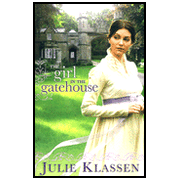I love to read Jane Austen. I think that I am a bit of a fan but yet I really don't explore her past. I have never joined a Jane Austen society (such things do exist). I know very little about the Regency period. Until reading this book, I am not sure I knew what that period of time when Jane Austen lived is called (A regent ruled in place of the actual sovereign). I also do not really read books that are written in the style of Jane Austen. There are books that retell Pride and Prejudice, add monsters, tell what happened next. I had seen books at the bookstore that were Christian versions.
As reported in a previous post, I have been given the opportunity to review books for Baker publishing. I chose this selection because of my love of Jane Austen. The girl in the gatehouse by Julie Klassen is written in the time of Jane Austen. Most of Jane Austen's stories tell of the struggle of woman to get along in their society. Usually this involves obtaining a husband in order to secure a happy future. With the exception of Emma, the heroine does not have a prominent enough place in society to assure that is going to happen. Fanny of Mansfield Park is a poor relative. Eleanor and Marianne in Sense and Sensibility are the daughters of a happy second marriage but are left with little prospects after the death of their father and when the brother the heir takes over their home. In Pride and Prejudice, Elizabeth and her sisters' lack of prospects are because there are five of them and the estate belongs to a relative who is the heir because they have no brother. Sometimes, in Jane Austen novels, some of the characters take matters in their own hands and do something that we would not be shocked by today but would be the ruin of the girl and her family in that time. These girls lose their virginity. Usually their punishment is that they are sent away. Jane Austen never tells what happens to these girls. The "good" girls end up happy ever after but what of the "bad" girls.
In The girl in the gatehouse, this is where Julie Klassen begins her story. Mariah Aubrey is sent away because she has brought shame on her family. Mariah is sent to live in the gatehouse of the estate of her "Aunt Fran" (the wife of her late uncle who is remarried and rewidowed). She is banished from her family and the neighborhood where she lived. Mariah is accompanied by her Dixon, her former tutor turned companion. These two women must start a new life with very little assistance.
What I enjoyed most about this story is that they build their own community. They take their difficult situation and start afresh. They learn to cook and clean. Mariah begins earning a living by writing which as Jane Austen herself knew was not proper for young women. Mariah like Jane Austen writes without her own name on her books.They make friends with the staff of the estate and they begin to get involved in the lives of the residents, young and old, of the poorhouse adjoining the estate. There is a man who haunts the roof of the poorhouse. Why is he there? Why is the poorhouse so close to the estate? Why is the gate locked?Dixon finds love for the first time. Mariah is not caught up in her own guilt and own misery but begins to move on and reach out to others. These people are not the of the society that she has been banned from. Martin, who they inherit from Aunt Fran when she dies, is a man of many secret talents and he begins to change their gatehouse into a home. Aunt Fran also leaves Mariah her treasure, but what is it?
Mariah meets the estate's new tenant, a naval captain who now has wealth but wants so much to enter the life of a gentleman. Mariah and he form a friendship that helps them both find a path to forgiveness and acceptance. In trying to find the mystery behind the locked gate, they find the path through the gate that leads to Christ. I won't reveal the mysteries of the estate and if they find love with each other. You'll have to read it to see.
I would recommend this book as a fun story of redemtion through the means of a community who accept you as you are. In doing so, they help each other find true acceptance in Christ.
I received this book free in exchange for this review, but received no other compensation.

No comments:
Post a Comment